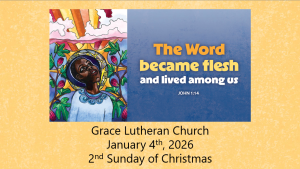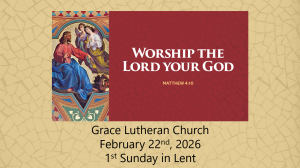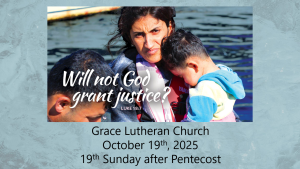Hi everyone,
Welcome to worship for this 4th Sunday in Lent, landing on March 30, 2025!
The bulletin for this service can be found here. You can use it to follow along in the service, or just using the words on your screen. The sermon manuscript can be found both in the bulletin as well as on this page below the video.
For a fuller worship experience online, you are welcome to have a candle in your space, lit at the beginning of the service and extinguished near the end, when the altar candles are extinguished after the sending hymn. You are also welcome to participate in communion if you’re comfortable, by having something small to eat and drink prepared for that time in the service. Further instruction will be given then.
May God’s unending love and forgiveness bring you peace and blessing, this day and always!
Almighty God, open our minds by your Spirit, that we might see you, hear you, and know of your love for us, through Jesus Christ our Lord. Amen.
So full disclosure, this is my third version of this sermon. It’s not because I enjoy writing sermons so much that I wrote three different ones for this exact day, but it’s because something happened before I finished the second version that I honestly could not get it out of my mind. Don’t ask me what happened to go from version 1 to version 2, because that wasn’t really good sermon writing material.
Anyway, what happened that drove me to come up with this version 3 actually started over a month ago, when my wife noticed a fairly large transaction with Air Canada on one of our credit cards. This was kicking on the heels of another not-as-large transaction on another card that was flagged and taken care of right away. But this one? Not so much.
We called the bank, of course, to tell them that this wasn’t us and they were pretty good. They cancelled the cards and issued new ones right away and they forwarded the case to their investigations team or whatever. And that is where it all went sideways. I don’t really want to bore you with the details (not now at least), but let’s just say that after a lot of back and forth on the phone, they are still claiming that we’re on the hook for $1700. It’s not over yet, but that’s just where it is now. And it sucks.
I don’t want to pay $1700 for a flight that I didn’t take. I don’t want to fund some scammer’s vacation to who knows where. I don’t want to lose my hard earned money, for which I wrote like 3 sermons for one day, for no good reason. Mostly because that kind of money is hard for me to save up. And for an amount like that to just go up in smoke? I’m not fan.
But of course, right? Who would be?
I know losing this particular amount of money would hurt different people in different ways. Easier for those who have a lot of course, but harder for those who don’t. I hate to say it, but money is important to all of us and is needed for pretty much everything we do. So it already hurts when we don’t have much of it or it’s not enough. It hurts when we lose it or mismanage it. And it really hurts when it’s just taken away at no fault of your own.
And this takes us to the reading out of our gospel lesson today, where we get the parable that is most commonly known as the Prodigal Son. But while the situation of the younger son in the parable isn’t exactly like mine, it is quite precarious nonetheless, and he does actually run out of money. I mean, we know this story, even if we somehow haven’t heard it in church before. It’s probably one of the most famous of Jesus’ parables, aside from the Good Samaritan.
The younger son decides he wants his inheritance and go and see the world. His father obliges and off the son goes. But before too long, due to his extravagant living and apparently finite resources, he finds himself financially destitute and eating with both literally and ritually unclean animals. This would be rock bottom for anyone, but for someone who is at least insinuated to be very wealthy? It is worse than death. So he does what any riches-to-rags son would do, he goes home to ask for a job.
And again, we know the story, the father runs out to greet him and welcomes him home before he could even apologize or grovel or beg, and kills a fatted calf for a feast and grabs a ring and a robe and just spares no expense. Of course he would, his son is back. Albeit his number two of two sons, but that’s still his son we’re talking about.
But wait, there’s more. At this part of the story, the plot twists. I mean if it just ended with the feast, then it’d be a nice clean package, and we’d be content with the story. But it doesn’t end there. Instead we’re reminded that there is another son that we haven’t even heard from for like 14 verses, and he comes in with pent up fists in the air. He’s angry that his brother is back, angry that there is a feast to that effect, and angry that he doesn’t get the same treatment or fanfare as that younger brat regardless of how perfectly responsible he has been.
We hear the attitude of this older brother, the first born, the true heir to the throne, and often we would just shake our heads and just think typical older brother. Because really, there are a lot of negative stereotypes around the oldest child. Most of them true according to my experience as the youngest child, which by the way, has a lot of false stereotypes. But we know the stereotypes around the eldest offspring and we might think that is just what’s going on here.
And maybe it is, but there is more than that. See like I said, this is the oldest, the responsible one, the one that will truly carry on the bloodline and legacy. While all the children will get an inheritance, the oldest will get about twice as much as everyone else. This is so they will have a better chance to actually carry on that bloodline and legacy, and continue propagating this family and name. We might look at this and think it isn’t fair, especially if we’re not the eldest sibling, but let’s not forget that there is a lot at stake for that one child. So it’s important that they have every advantage at their disposal to make sure they can do what they are expected to do for the family honour.
Furthermore, it wouldn’t be uncommon then, for the younger son to ask for an early inheritance to take advantage of a good crop year or lower housing market or something, just to get a leg up on their carving out a name for themselves apart from the family. So when the younger son came back after losing his rightful portion, who do you think is flipping the bill for his welcome home feast? Who do you think raised and was saving that fatted calf for something special? Whose robe and ring do you think was given to that irresponsible son?
See, not only did the father give the younger son more than his fair share, he also took away from the older son, his share, and his chances at successfully carrying on the family legacy. The father didn’t just put himself at risk, he put the generations after him at risk.
And so then maybe we can understand the older son’s anger toward his father’s graciousness in welcoming the other son back. We can kind of get the Pharisee’s and scribes’ indignation toward Jesus’ generosity in eating with the lesser folk in the community. We might even feel justified in our own worries and concerns about the time, money, and other finite resources that might be directed at projects, initiatives, and even people that we might not think are worth it.
I mean, why should our hard earned money go to someone else? Why should we be penalized for their shortcomings? Why should our finite resources be shared with others?
And this isn’t wrong, per se. We should be aware and careful of what happens with what is ours. We should be efficient and effective with what resources we have. We should be responsible with all that is entrusted to us.
But what the Pharisees and scribes didn’t see, what the older brother didn’t understand, what we might not be cognizant of, is that with God, there is an abundance of blessing that overflows our cups. With God, there is grace upon grace that showers over each and every one of us individually and communally. With God, there is enough.
So while the older brother grumbled because his pot was being dipped into, while the Pharisees and scribes complained about their fair share being shared with others that didn’t earn it, while we might be worried that what we deserve might be given to someone else, rest assured that God gives as God gives, wholly and abundantly, and lavishly blesses us all with mercy, forgiveness, and love. God isn’t a mystical Robin Hood who takes from the rich and gives to the poor. God isn’t an elected government who has to tax and tax and tax in order to make sure people have enough services. God isn’t a limited and finite resource that can ever be depleted. Instead, God abounds with abundant grace and mercy further than we could imagine. God reigns with infinite love in our hearts and in God’s kingdom. God’s welcome, community, and salvation remain limitless.
As we approach the end of this season of Lent, may we always be reminded of how God has no limits or bounds and will continue to hold us with unending arms of love, and forgiving us with a grace that stretches for eternity. Thanks be to God. Amen.




